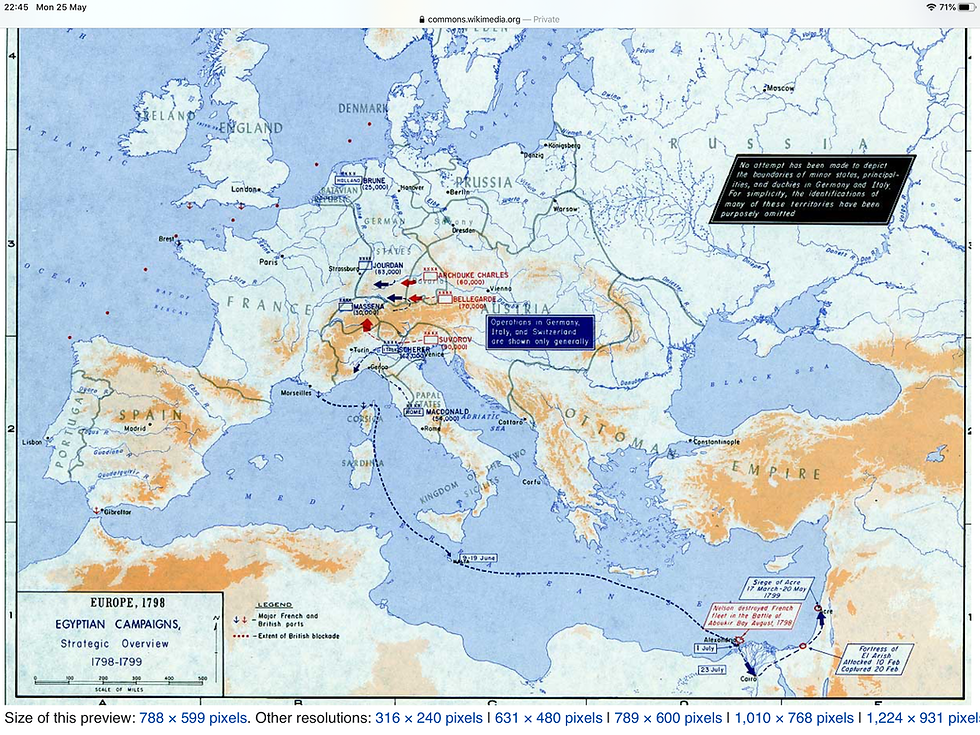D - 45: Famous People in the Mediterranean - Horatio Nelson
- hbanziger
- May 27, 2020
- 4 min read
Updated: Mar 26, 2021
On our journey from Genoa to Sicily we will cross the path of some famous people who at one point in their life were busy in the area. Am going to start this mini-series with Horatio Nelson, the famous British Admiral, who beat the combined French-Spanish Fleet at the Battle of Trafalgar in 1806. The loss of the fleet forced Napoleon to abandon his plan to invade the United Kingdom. He attacked Austria instead.

Young Horatio Nelson
Nelson’s naval career started during the American War of Independence but took really off in 1793 when revolutionary France declared war again on England. The European landscape looked very different than a few years later. Italy was not conquered yet, the Republics of Genoa, Venice and Switzerland, the Papal State and the Kingdom of Naples were still independent and neutral, the British Navy had a foothold in Toulon which had rebelled against revolutionary France. Albeit that foothold was lost in the same year due to Napoleon’s novel way of deploying artillery.

Europe in 1792
To prevent an invasion of the British Islands, the British Naval strategy was twofold:
A) Do not allow the allied French and Spanish Fleet to combine;
B) Maintain navel superiority in the Channel at all times.
For that purpose, the British Navy started blockading the ports of Brest, El Ferrol, Cadiz, Cartagena and Toulon where the French and Spanish Navies were stationed.
Blocking these harbors was easier said than done and posed a significant logistical challenge. England had no naval basis in the Mediterranean but was limited to Gibraltar.
The Mediterranean was the place where Nelson spent most of his time. Dispatched in 1793 with the HMS Agamemnon, a 64-gun battleship of the line, he saw action before Toulon, Genoa and Corsica. With no naval base to fall back on, he frequently called on harbors like Genoa, Livorno, Naples, Cagliari and Tunis to resupply or to make the necessary repairs after battles with the French. All these harbors were neutral and open but one after the other closed with the progress of the French Army in Italy. After the decisive French victories in 1799, the British Navy had lost its last access.

HMS Agamemnon opening fire on the French 80-gun battleship “Ça Ira” in 1795
Trying to secure a naval base was always high on Nelson’s list of priorities. In 1794, he was dispatched to support the Corsican Independent Movement and captured the Corsican harbor of Bastia (end of our first sailing week). He then moved on to besiege Calvi (we will visit during our second week). A few days before Calvi was taken, Nelson was hit by splinters in one of his forward batteries and lost his right eye. Seven years later, during the battle of Copenhagen in 1801 he claimed not to see his Admirals signal to seize fire since he had only one eye!

The fortress of Calvi was taken by the British on 18 July 1794
His injury would not prevent him from leading many more fleet actions around the coast of Liguria and Elba the following year nor starting his scandalous liaison with Lady Emma Hamilton, the British Ambassador’s wife in Naples. But when the Spanish Fleet broke the blockade of Cartagena in 1796, the British Navy was forced to pull out. Keeping its naval superiority in the Channel was more important than protecting independent Corsica which was re-captured by French forces as soon as the British Navy left.
Within months, the British Navy found the Spanish Fleet off Cape St Vincent and brought it to battle. The engagement ended inconclusively with most of the Spanish ships being able to retreat to the safety of Cadiz but it brought Nelson the promotion to Rear Admiral for his valent actions. As newly promoted Flag Officer he spent the next two years between Cadiz and Tenerife where he lost his right arm during an amphibious landing.
In 1798, Nelson was back in the Mediterranean with the same mission as in 1793: prevent the break-out of the French Fleet in Toulon. Napoleon had set his eyes on Egypt from where he wanted to push into India to make its riches available to the French Revolution. Napoleon was always short of money. Bad weather allowed Napoleon to slip out of Toulon

Napoleon's route to Egypt - on the way he conquered Malta
undetected but Nelson caught up and sank the French Fleet at the Battle of the Nile two months later, In August 1798. It was one of the biggest naval victories of the British Navy and made Nelson the immediate darling of the British public. The strategic consequences of the victory were profound. Napoleon’s ambitions towards the East were thwarted, the Ottoman Empire stayed out of the war and England could remove the French Forces from Malta which became a British Dominion. Finally, in 1800, the British Navy had its fortified naval base in the Mediterranean that it was looking for.

The French flagship Orient exploding at the Battle of the Nile, 1796
After a few years of absence, Nelson returned to the Mediterranean again in 1803. He stayed there as Commander-in-Chief until the decisive Battle of Trafalgar which finished Napoleon’s dream of invading the United Kingdom. As we all know, Nelson did not survive the battle. Most people know about Trafalgar. Many know about Lady Hamilton. Very few know about Nelson’s role in gaining independence for Corsica.







Comments